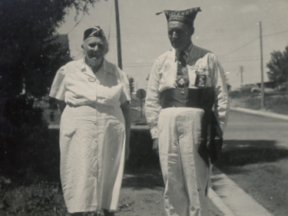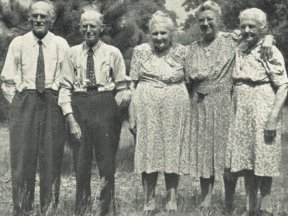Spinnel Anna of North Sweden
High School Foreign Languages (North Germanic, East Scandinavian, Swedish)
I. Objectives (The student will:)
- Discover the additional letters (Åå, Ää, and Öö)
which come after Zz in the Swedish language.
- Explore the use of a patronymic naming system.
- Find the information for and prepare a four generation ancestor chart for a Swedish folk hero.
II. Overview
Assume you have learned that one of your grandparents was a Swede
and that a part of his/her ancestry is recorded in a book. Although parts
of the book are in Swedish
you have just found a copy of an English
translation
of the first chapter.
You first note that the unfamiliar letters (Åå, Ää, and Öö)
are very common even in the translation.
Since this documents the family before the 1800's,
several differences from our modern life are quickly apparent.
One such difference is that the second (last) name is
not a family name (surname), but rather often seems to indicate parentage.
Thus Tomas Hansson's father was Hans. His son might be Hans Tomasson.
This is known as a patronymic naming system.
Although the family information is there, it isn't
organized in a manner most conducive to entry into a genealogy program.
Thus, while reading the stories, you will extract family relationships
which will enable you will complete an ancestry chart.
There is a 4-generation ancestor chart at the end for assembling
what you find. Ancestors are usually numbered
(Kekule's system)
with the father being twice
the child and the mother being one more than that. Thus the ancestor Anders
Ersson is at the left as number 1 and his 8 great-grandparents should be entered
on the right as numbers 8-15 with his parents (2, 3) and grandparents (4-7)
in between. The father always goes above the mother on these charts.

|

|

|
| Swedish Grandparent, 1964
| Swedish Grandparent with mother
| Great-Grandmother with siblings
|
Pictured above are your teacher's family in 1964 with your teacher on the
left of his grandfather; the grandfather with his mother; and the
great-grandmother with her siblings. Anders Ersson in the table below
was the teacher's great-grandmother's great-grandfather.
III. Procedure
- Print out this web page
(
http://www.andrews.edu/~calkins/math/webtexts/spinnelz.htm).
There is a 4-generation ancestor chart at the end for assembling
what you find.
Some data may not be available on-line, thus some boxes have been shaded.
Ancestor numbering is described above.
- Go to
http://mysticplanet.com/SWEDEN.HTM
and listen to the National Anthem of Sweden.
- Go to
http://www.travelfile.com/go/UMEA+SWEDEN.html,
view a map of the region, and read the general information about Scandinavia.
- Go to http://www.andrews.edu/~calkins/genealog/spinnela
noting especially the table of contents.
This file is the English translation of chapter one of the book
Spinnel Anna Släkt. You will find here the information necessary
to complete in the ancestor chart. The table of contents may save you time
exploring the various family relationships, (once you've determined
Spinnel Anna was Anders Errson's mother).
- http://www.spinnelanna.se
(this "web hotel" has been intermittant) contains some of the same
information as chapter one.
- When completed, turn in your ancestor chart, then discuss
the bear story with a classmate.
- For extra credit, include birth/marriage/death dates/locations below
each name in the ancestor chart.
- For additional extra credit,
download the genealogical software Brother's Keeper from
http://ourworld.compuserve.com/homepages/Brothers_Keeper/,
enter this ancestor information, export it in GEDCOM format, then load it into
the Rootsweb World Connect project at
http://worldconnect.rootsweb.com/.
Happy hunting!
| | | | | 8.
|
| | | | 4.
|
| | | | | | 9.
|
| | 2.
|
| | | | | | | 10.
|
| | | | | 5.
|
| | | | | | 11.
|
| 1. Anders Ersson
|
| | | | | | 12.
|
| | | | | 6.
|
| | | | | | | 13.
|
| | 3.
|
| | | | | | 14.
|
| | | | 7.
|
| | | | | 15.
|
See: http://nadeducation.adventist.org/futures/curric/study/912.html for relevant standards.





